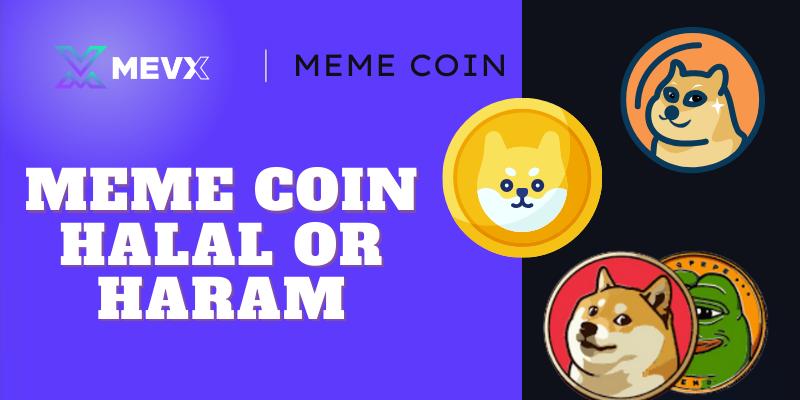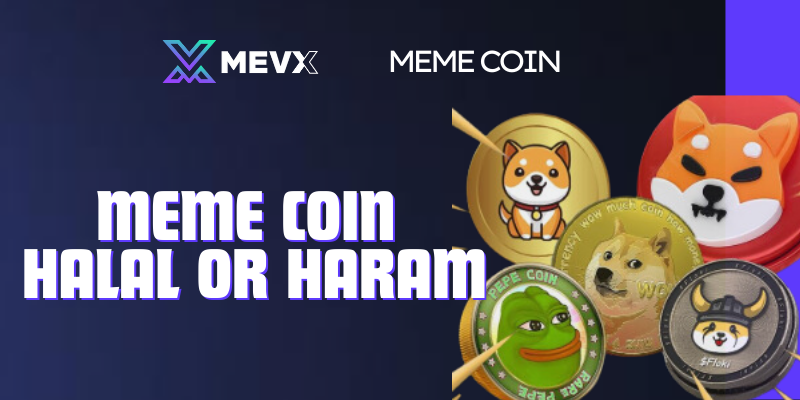Meme Coin Halal or Haram? An Islamic Finance Perspective for Muslim Investors
Meme coins, like Dogecoin and Shiba Inu, have taken the cryptocurrency world by storm. With their humorous origins and speculative nature, they often attract investors looking for quick profits. However, for Muslim investors, the question remains: Meme coin halal or haram according to Islamic finance principles?
What Are Meme Coins?
Meme coins are cryptocurrencies that are created around internet memes or humorous themes. Unlike major cryptocurrencies like Bitcoin or Ethereum, meme coins typically lack intrinsic value and are highly dependent on market hype and community-driven popularity. These coins are often subject to extreme price fluctuations, making them speculative investments.

Islamic Finance Principles: Evaluating Meme Coins
Islamic finance is based on principles that emphasize ethical investing, fairness, and real value. To determine whether meme coins are halal or haram, we need to evaluate them through two core Islamic finance concepts: Maysir (gambling) and Gharar (excessive uncertainty).
1. Maysir (Gambling) and Speculation
In Islamic finance, Maysir refers to gambling, which is strictly prohibited. Investments that resemble gambling, where profits are based on unpredictable outcomes instead of sound valuation, are considered haram. Meme coins are highly speculative and driven by market hype, making them resemble gambling more than prudent investment. This speculative nature raises concerns about whether meme coins can be deemed halal or haram.
2. Gharar (Excessive Uncertainty)
Gharar refers to excessive uncertainty or ambiguity in a contract or investment. In the case of meme coins, their high volatility and lack of tangible utility or intrinsic value mean they carry a significant amount of risk and uncertainty. Investments that are excessively uncertain, like meme coins, do not align with the ethical standards of Shariah finance. As a result, meme coins would likely be considered haram due to the excessive uncertainty they involve.
3. Pump-and-Dump Schemes
Meme coins are often associated with pump-and-dump schemes, where early investors inflate the price through hype and speculation, only to sell off their holdings once the price peaks. This behavior exploits later investors and is considered unethical in Islamic finance. Such practices are considered haram as they promote unfair trading and result in financial harm to others.
4. Lack of Intrinsic Value
Islamic finance principles dictate that investments should be based on assets with intrinsic value or utility. Meme coins, however, usually lack real-world application and derive their value primarily from community-driven demand. Since meme coins don’t provide tangible benefits or utility, they do not meet the criteria for being halal investments in Islamic finance.
Scholarly Opinions on Meme Coins
Several respected Islamic scholars have addressed the question of whether meme coins are halal or haram. Here are their perspectives:
- Mufti Taqi Usmani, a leading authority on Islamic finance, stresses that investments should be based on tangible, ethical value. He argues that speculative assets like meme coins, which lack real utility and value, do not align with Islamic principles.
- Sheikh Dr. Haitham al-Haddad warns that financial decisions involving extreme risk and volatility, such as investing in meme coins, violate the ethical guidelines of Shariah.
- Mufti Faraz Adam advises Muslim investors to steer clear of high-risk investments like meme coins, recommending instead assets that provide clear societal benefits and have intrinsic value.
Should Muslim Investors Avoid Meme Coins?
Given the high failure rate of meme coins—reports indicate up to 97% of meme coins fail—many scholars recommend that Muslim investors avoid them. Instead, they should focus on more stable cryptocurrencies with clear utility, such as Ethereum or Solana, which align better with Shariah principles and are less speculative.

Meme Coin Halal or Haram?
In conclusion, when it comes to determining whether meme coins are halal or haram, the overwhelming consensus among Islamic scholars is that they lean toward being haram due to their speculative nature, high risk, and lack of intrinsic value. For Muslim investors, the ethical approach is to avoid investments like meme coins and instead prioritize cryptocurrencies with practical use cases and stable value. This approach ensures that financial decisions are in line with Islamic finance principles.
By choosing investments with real-world utility and minimizing exposure to speculation, Muslim investors can ensure that their portfolios align with both their financial goals and their faith.
In conclusion, meme coins, with their high speculative nature and lack of intrinsic value, are generally not in line with Islamic finance principles and can be considered haram. To ensure your investments align with ethical values in Islam, Muslim investors should avoid these coins and instead focus on cryptocurrencies with real utility and stable value, such as Ethereum or Solana.
For more insightful updates and investment advice aligned with Islamic principles, don’t forget to follow MevX Blog for future posts!
The post Meme Coin Halal or Haram? An Islamic Finance Perspective for Muslim Investors appeared first on Blog Mevx.
source https://blog.mevx.io/memecoin/meme-coin-halal-or-haram/
Comments
Post a Comment